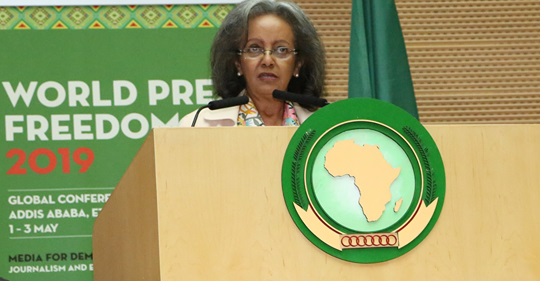Danger of Fake News and Disinformation in Ethiopia - ENA English
Danger of Fake News and Disinformation in Ethiopia

Addis Ababa May 3/2019 Social media has played major role in the wave of protests witnessed in Ethiopia in the past few years that led to the coming of prime Minister Abiy Ahmed to office.
Social media platforms have played an indispensable role during the unprecedented wave of protest that hit the Horn African country since 2016.
Currently, this digital phenomenon comes up with a challenge that requires attention as it is being used to instigate violence.
In her speech at the opening of the World Press Freedom Day in Addis Ababa, President Sahle-Work Zewde said that social media have dramatically transformed the media landscape in the world and Ethiopia is no exception to that.
Just a year ago Ethiopia’s track record was bad regarding freedom of expression. However, this image has now changed for the better following major steps taken in the country since the Prime Minister Abiy Ahmed assumed office last year.
The release of activists and journalists who have been in prison, the opening of once closed websites and blogs as well as media houses, which were banned, allowed to operate locally, are among the measures that influences the change.
This positive gesture of the Ethiopian government has enabled the country to climb higher on the World Press Freedom Index faster than any other country.
The President said the country climbs 40 places up, showing how much can be achieved when a political will exists.
While acknowledging media and democratic reforms the president did not hide her annoyance on fake news and disinformation which has been threatening the unity of Ethiopia.
She said that the current 'outrageous polarization of political discourse' in Ethiopia mainly results from social media incitement to extremism and violence.
“The danger of fake news and the growing climate of disinformation are spreading like wildfire and causing havoc that we are facing as a nation,” she stressed.
The president underlined the situation is much more pronounced in countries like Ethiopia where the political culture and institutions of governance have not yet matured.
Fake news and disinformation increases risk of violence across the globe, which she said need to foster dialogue on ways of minimizing the impact.
“We need to series of dialogue to respond to these common challenges that we are facing. It is time for us to make discussion how can the impact of social media be mitigated without affecting the safety of the public,” the president called on.
Arnaud Froger, Head of African Desk at Reporters Without Borders agrees that fake news and disinformation especially on the social media platforms are major challenges for Ethiopia.
“It is a country where media is very much polarized, where there is ethnic conflict as well we know fake news and incitement of violence spreading on social media even sometimes on the conventional media.”
Froger said that the Ethiopian media houses are enjoying 'exceptional media freedom' currently, mentioning that no journalist is in jail and many media outlets and hundreds of news website have been allowed to operate in the country.
However, the challenge that fake news and disinformation poses at the country need to be addressed urgently, Froger said.